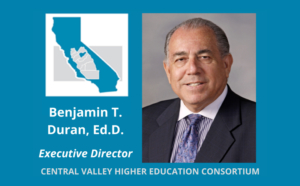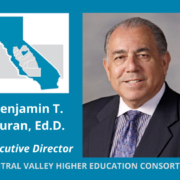[vc_row][vc_column][vc_column_text]
Mini-Grant Success Stories
COS Equitable Teaching Institute supports faculty learning
NOTE: For the past three years, Central Valley Higher Education Consortium Mini-Grants have been awarded to member institutions in support of CVHEC’s mission to increase degree attainment rates. We are highlighting how our member institutions’ innovative uses for the grants are positively impacting students.
The Equitable Teaching Institute at College of the Sequoias this summer engaged 10 faculty in an innovative four-week interdisciplinary cohort-based summer learning session that studied equitable pedagogy and how to apply it to gatekeeping courses at COS thanks to a $7,500 Central Valley Higher Education Consortium Mini-Grant.
The CVHEC Mini-Grants project, currently funded by the College Futures Foundation, provides awards up to $10,000 each which faculty from member institutions have creatively used for individual projects that help achieve the consortium’s strategy of increasing degree attainment rates. Previous mini-grants have supported assistance and professional learning associated with Guided Pathways, Math Pathways, implementation of Corequisite English and math, course development and advancement of Pathways for Associate Degrees for Transfer.
The 2021 funding cycle also sought to additionally incentivize basic needs and equity, race and social justice work.
At COS, ten faculty selected a different gatekeeping course and examined ways to reduce equity gaps for that specific course. This occurred in two phases done over four weekly themed sessions led by project coordinators Megan Baptista and Matthew C. Nelson, English professors at COS.
The Equitable Teaching culminated with the ETI Faculty Presentation Showcase Aug. 11 as part of the college’s Faculty Development Workshop Series attended by over 40 faculty colleagues during Fall 2021 Convocation Week.
At the culminating showcase, the ETI participants shared their findings, proposed changes and new pedagogy insights, reported Nicole Bryant Lescher, Far North regional coordinator for the California Community College Success Network (3CSN) who served as observer for the project’s first phase in June.
“The presentations were received well with many staying more than 30 minutes over the scheduled two-hour time slot to engage their colleagues about this work,” reported Lescher, who is a professor of English at the College of the Redwoods. “Faculty who attended this workshop left very positive comments in their evaluations and often remarked on changes they hope to make in their courses as a result of these presentations.”
Dr. Benjamin T. Duran, CVHEC executive director, said the COS Equitable Teaching Institute is “a perfect example of how Mini-Grant funds can support faculty learning toward equitable teaching.”
The faculty participants had three learning outcomes for the institute, Lescher reported: review equity concepts and identify local contexts driving equity gaps; explore culturally relevant teaching pedagogy; and use culturally relevant teaching and other equity frameworks to developed student-centered practices, policies, language and assignments for each cohort member’s identified gatekeeping course.
They also had three deliverables as a result of the program: a detailed reflection on their learning that outlined the changes they intend to make for their gatekeeping course; a proposal for a project inspired by the institute (the deliverables for each project varied, but typically these deliverables were tied to ETI faculty presentations during convocation week); and the final presentation at the ETI Faculty Presentation Showcase.
“One key takeaway many instructors found in the data was that small changes in how we teach can help us reduce and even close gaps,” Lescher said. “For example, in English 1, we observe equity gaps for African-American and Hispanic students.
“Between 2014 and 2021, those students were significantly less likely to succeed in English 1,” she explained. “However, the minimum number of students from those groups who would have needed to pass to shrink the gaps is 13 and 80, respectively. If we could get 31 more African American and 181 more Hispanic students to pass English 1, the equity gap disappears.”
She said there are 116 sections of English 1 being offered in fall 2021 and “each of us, making small changes focused specifically on disproportionately impacted student groups, can help close these gaps. If we can help just one more disproportionately impacted student meet the learning outcomes and pass in each English 1 section, we will have almost closed these gaps.”
The participants observed similarly achievable goals in all the gatekeeping classes examined during the institute, Lescher noted.
Nine out of the ten faculty members who presented and their topics are:
- Randy Villegas – “Students in Political Positions of Power”
- David Jones – “Grading Systems and Income Inequality”
- Jenny Heaton – “Reducing Student Anxiety and Fostering Student Agency”
- Samantha Sousa – “Creating a more equitable syllabus”
- Tracy Redden – “Syllabus Updates for Equity”
- Lisa McHarry – “Freeman, Engaging Diverse Voices with Social Annotation”
- Melissa Myers – “Creating Equitable Math Content Courses for Pre-Service Teachers”
- Courtney Traugh – “Student Learning Teams”
- Victoria Rioux – “Using UDL to Make Fieldwork More Equitable”
The project also provided an additional outcome: faculty participants engaged in learning together and found ways to apply what they learned to their courses, said Baptista.
“The grant money allowed us to pilot a project that engaged faculty in equity work, improving both our understanding of the work and how that work appears in our classrooms,” she said. “In the words of one of the participants, ‘I was unsure of this equity work, but after finishing the course, I am fully onboard.’”
The COS project’s $7,500 funding was proposed in the two phases with two main categories: stipends (6,500) and materials (1,000). For stipends, $1,000 each was earmarked for the two coordinators and $2,250 each for the nine participants.
The remaining $1,000 was used to purchase texts to facilitate continued faculty learning and engagement with equity conversations in their discipline and in their courses.
Applications for the next Mini-Grant cycle will be accepted beginning November 1, said Angel Ramirez, CVHEC operations manager (angelr@mail.fresnostate.edu).[/vc_column_text][/vc_column][/vc_row]




 The CVHEC Mini-Grants project, currently funded by the College Futures Foundation, provides awards from $5,000 to $7,500 each which faculty from member institutions have creatively used for individual projects that help achieve the consortium’s strategy of increasing degree attainment rates.
The CVHEC Mini-Grants project, currently funded by the College Futures Foundation, provides awards from $5,000 to $7,500 each which faculty from member institutions have creatively used for individual projects that help achieve the consortium’s strategy of increasing degree attainment rates.


